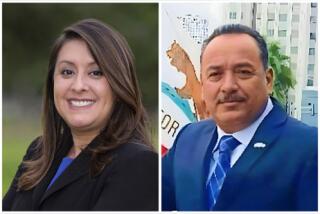Roybal Leaves House Legacy to Daughter
WASHINGTON — About this time a year ago, Rep. Edward R. Roybal (D-Los Angeles) was planning to run for a 16th term in anticipation of serving at least two years in Congress alongside his daughter.
“We would have been the first father and daughter team in history,” Roybal said in a recent interview.
But his wife’s poor health--combined with the drain of constant travel between Washington and California--persuaded Roybal last February to retire at the end of this year after three decades in the House. Assemblyman Xavier Becerra will occupy Roybal’s East Los Angeles seat, but the 76-year-old Democratic congressman said he views his daughter, who won a neighboring House district, as his true successor.
The election of Assemblywoman Lucille Roybal-Allard to Congress is “one of the highlights of my political career,” the elder Roybal said. “I never dreamed that my daughter would be interested. I feel I am passing on to her many of the things that I have started.”
Roybal established himself as an institution in Los Angeles political circles, having served 43 years continuously as a city councilman and congressman. A new downtown federal office building near Union Station is named after him, as is a geriatric center he founded at Cal State Los Angeles.
He was the first Latino elected official in Los Angeles, the first to serve on the City Council, the first to run for statewide office this century and the first sent to Congress from California.
“If you take a look at Hispanic political development over the past 30 years, there is no one with clearer leadership qualities than Ed Roybal,” said Harry Pachon, executive director of the National Assn. of Latino Elected and Appointed Officials. “He has been the driving force behind national Hispanic organizations.”
In his heyday, Roybal was considered among the most influential members of Congress in his areas of interest--adequate health care for minorities and the elderly, humane treatment of illegal immigrants and bilingual education.
As one of 13 “cardinals” who headed appropriations subcommittees that control House spending, Roybal wielded considerable power over federal programs. He assumed the role of a national champion for senior citizens after the 1989 death of Rep. Claude Pepper (D-Fla.) In his dozen years as chairman of the Select Committee on Aging, Roybal said, he succeeded in earmarking funds for 10 geriatric centers across the country, including three in California.
But Roybal rarely received credit for his efforts. This was largely because of his preference of working quietly behind the scenes. Several of his staffers expressed frustration at Roybal’s refusal to generate publicity for his own legislative accomplishments.
The best advice he has passed on to his daughter, Roybal said, is: “You never have to take back what you didn’t say. Before you make a decision, you study both sides of the problem, then decide what is best for your district and the nation. Many have come out here immediately and think they are going to take over. You can make a change without raising too much of a fuss.”
Reflecting on his career in Washington, Roybal said in typical understated fashion, “I had a lot of good moments during the time I was in Congress and I had some bad moments too.”
The darker side included a reprimand from his House colleagues in 1978 for lying about a $1,000 gift from South Korean lobbyist Tongsun Park. Roybal remains bitter about the outcome, and said he intends to vindicate himself by writing a full account of the case.
“It was real terrible the way I was treated,” Roybal said. “It was strictly discriminatory, no two ways about it. I am going to bring all that out, even to the point where the prosecutor broke into my office after he told me I was not a target.”
Roybal said he regrets only one vote since coming to Washington in 1962. In 1964, he joined his House colleagues in unanimously passing the Gulf of Tonkin resolution, which gave President Lyndon B. Johnson authority to “take all necessary measures” to maintain international peace in Southeast Asia. Roybal said he had opposed the Vietnam War and initially cast his vote against the resolution.
“I was urged by my colleagues to change my vote,” Roybal said. “And I was just a new guy around here so I went along with it. Well, that was a mistake because it was taken as the authority to expand the war in Vietnam.”
Beginning next month, Roybal intends to devote much of his time doing volunteer work for the Edward R. Roybal Foundation at Cal State Los Angeles. He donated more than $500,000 in leftover campaign money to establish a scholarship fund to train students how to apply modern research in caring for the elderly.
“I started this gerontology center business 20 years ago,” Roybal said. “While I leave with regret here, I will do something else that is also important to my community and the nation. I’m too young to just retire and do nothing, believe it or not.”
More to Read
Sign up for Essential California
The most important California stories and recommendations in your inbox every morning.
You may occasionally receive promotional content from the Los Angeles Times.










